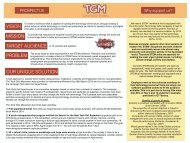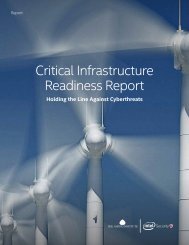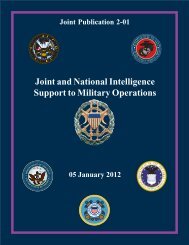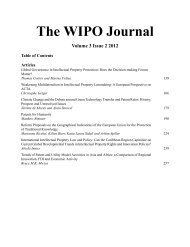Transparency Initiative (EITI)
2eoch1l
2eoch1l
Create successful ePaper yourself
Turn your PDF publications into a flip-book with our unique Google optimized e-Paper software.
67<br />
8.3.1 FISCAL TRANSPARENCY<br />
The <strong>EITI</strong> process in DRC has dramatically improved its fiscal<br />
transparency, largely following the <strong>EITI</strong> Standard and<br />
its requirements. As one interviewee said “la machine est<br />
en marche”, meaning that the process is now underway and<br />
improving with each Report, not only in content, but also<br />
in process.<br />
The initial <strong>EITI</strong> Reports took up to one year to prepare, with<br />
significant time spent in explaining the entire process and<br />
justifying it to a skeptical audience among companies and<br />
the government. The country’s 2014 <strong>EITI</strong> Report, its most<br />
recent, took approximately four months to complete, demonstrating<br />
a significant improvement in time. Indeed, the<br />
2012, 2013 and 2014 <strong>EITI</strong> Reports took little more than one<br />
year to produce in TOTAL.<br />
Data credibility and availability: The 2015 Report should<br />
be completed by Fall 2016, which will allow it to play a role<br />
in the budgetary debate. This could be the first time that it<br />
is not published at the end of the calendar year and within<br />
12 months of the fiscal year. In addition, data can be confirmed<br />
and released in shorter amounts of time. Several<br />
members of the government shared that data is now compiled<br />
and confirmed within three months of receiving preliminary<br />
data. With every year, the <strong>EITI</strong> process is cutting<br />
down the “confirmation” time, which makes data more relevant<br />
for constituencies, notably civil society organizations<br />
and the government.<br />
Following the money: A watershed moment for the <strong>EITI</strong><br />
process in Congo occurred in the publication of the<br />
2010 <strong>EITI</strong> Report in which a USD 88 million sum was<br />
unaccounted. The Auditor General systematically went<br />
through and found that indeed the money should have<br />
been deposited into government accounts, but was instead<br />
transferred to a commercial bank to assist with its liquidity<br />
issue.<br />
A similar result of improved fiscal transparency and a better<br />
understanding of the sectors can be expected if these are<br />
both introduced in the 2015 <strong>EITI</strong> Report. The point of “impact”<br />
in forestry and ASM should also be shorter than that<br />
of the oil, gas and mining sectors because the MSG, the National<br />
Secretariat and the government should be more efficient<br />
in incorporating both sectors into the <strong>EITI</strong> process.<br />
Several years ago, “it would have been impossible to think<br />
that the DRC would publish beneficial information”,<br />
quipped one interviewee. Despite that, the DRC participated<br />
in the beneficial ownership pilot and even garnered an<br />
award for it at the 2016 Lima Conference. This is a big step<br />
in erasing some of the questions around the link between<br />
politics and business. Please note that it publishes the beneficial<br />
owners on record with shares of more than 3%. Civil<br />
society organizations noted that a number of companies<br />
had their bases in the Virgin Islands and so it was impossible<br />
to know for sure who owned what, without further examination<br />
of those companies.<br />
<strong>Transparency</strong> (and Credibility) on the Page: The <strong>EITI</strong> Report<br />
is increasingly being seen as the most authoritative and<br />
creditworthy document published in the DRC. Examples<br />
such as the actual split (60% – central government, 25% –<br />
regional government and 15% – producing communities)<br />
of which level of government receives what percentage of<br />
revenue builds further legitimacy into the process. Nothing<br />
breeds success like success. Many stakeholders know that<br />
the information is received from several agencies, but that<br />
the authoritativeness of the information receives a boost<br />
because it is seen to have the necessary quality assurance<br />
built into it, which comes directly from the <strong>EITI</strong> Standard’s<br />
Requirement 5.<br />
With small victories like this, the country’s institutions are<br />
challenged and increasingly seen competent to deal with<br />
them. This provides them also with the much-needed confidence<br />
to carry out their duties.<br />
Other Sectors and Beneficial Ownership: ASM and Forestry<br />
will cover the DRC’s two great unknown sectors. This<br />
would be a very positive sign that the government is serious<br />
about fiscal transparency in other sectors of the economy.<br />
Civil society organizations still continue to point out irregularities<br />
and transparency challenges in both sectors.









